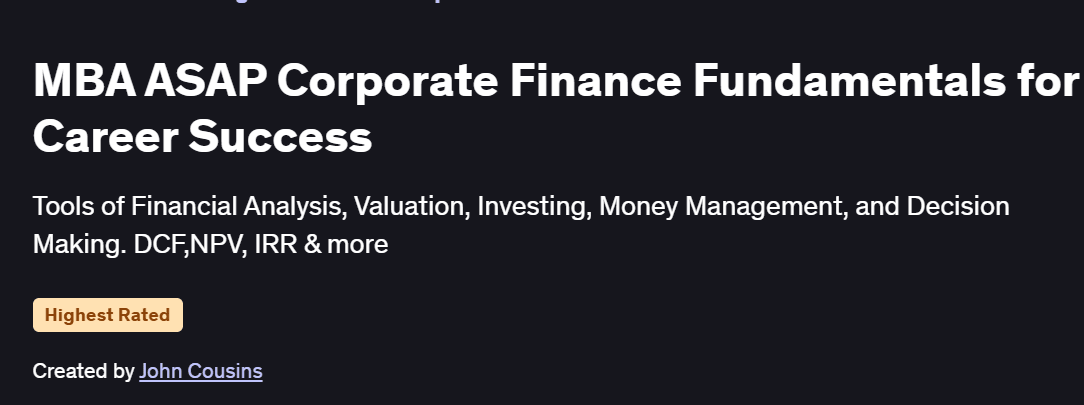What you will learn in MBA ASAP Corporate Finance Fundamentals for Career Success Course
Learners will understand the key principles of corporate finance, including the time value of money, risk and return, and the cost of capital.
The course covers how companies make financial decisions, such as capital budgeting, financing, and dividend distribution.
Students will explore financial analysis tools, including financial statements, ratios, and forecasting techniques to assess company performance.
- The course teaches the principles behind valuing assets, calculating net present value (NPV), and making informed investment decisions.
- Learners will gain insights into the role of corporate finance in maximizing shareholder value and ensuring long-term financial sustainability.
Program Overview
Introduction to Corporate Finance
⏳ 2-4 weeks
- Understand the role of corporate finance within an organization and how it relates to financial management, strategy, and operations.
- Learn the foundational concepts of corporate finance, including financial objectives and the goal of maximizing shareholder wealth.
- Study the difference between managerial finance and corporate finance, and understand their impact on business decisions.
Time Value of Money
⏳ 4-6 weeks
Learn about the concept of the time value of money, which emphasizes the value of money today compared to the future.
Study key concepts such as present value (PV), future value (FV), and discount rates.
Understand the importance of compounding, annuities, and perpetuities in making financial decisions.
Risk and Return
⏳ 4-6 weeks
Explore the relationship between risk and return, and how investors assess the profitability of financial assets based on these factors.
Study the Capital Asset Pricing Model (CAPM) and understand how to calculate expected returns based on systematic risk.
Learn how diversification can reduce risk and improve the performance of an investment portfolio.
Capital Budgeting
⏳ 4-6 weeks
Understand how companies evaluate and prioritize investment opportunities using capital budgeting techniques.
Learn about key methods like Net Present Value (NPV), Internal Rate of Return (IRR), and Payback Period to assess project feasibility.
Study how to analyze cash flows, risk, and return when deciding on long-term investments.
Financing Decisions
⏳ 4-6 weeks
- Study the different sources of capital that companies use to fund their operations, including debt, equity, and retained earnings.
- Learn about the cost of capital and how to make decisions regarding financing through debt or equity.
- Understand how capital structure affects a company’s risk profile and profitability.
Dividend Policy
⏳4-6 weeks
Explore the various factors that influence a company’s dividend policy, including profitability, growth opportunities, and financial stability.
Learn the impact of dividend decisions on stock prices and shareholder value.
Study the trade-off between retaining earnings for reinvestment and paying out dividends.
Financial Analysis & Performance Evaluation
⏳4-6 weeks
- Learn how to use financial statements to analyze a company’s performance and financial health.
- Study key financial ratios, including profitability, liquidity, and solvency ratios, and how to interpret them.
- Understand how to use forecasting techniques to project future financial performance and make strategic decisions.
Final Project: Apply Corporate Finance Concepts
⏳6-8 weeks
Apply the concepts learned throughout the course to evaluate a company’s financial decisions and strategies.
Conduct a financial analysis using real-world data and present your findings, including recommendations for improving financial performance.
Receive feedback and refine your financial analysis skills based on practical applications.
Get certificate
Job Outlook
Professionals with expertise in corporate finance are highly sought after in industries such as banking, investment management, consulting, and corporate sectors.
Corporate finance managers can expect salaries ranging from $70K to $100K for entry-level positions, with senior roles reaching $150K+ or higher.
Strong knowledge of financial analysis, investment strategies, and capital budgeting is essential for success in finance-related roles.
Specification: MBA ASAP Corporate Finance Fundamentals for Career Success
|
FAQs
- No prior MBA or finance degree is needed.
- The course is designed for beginners and mid-level professionals.
- Basic math and business awareness are helpful but not mandatory.
- Content is practical, not overly technical.
- Finance knowledge improves decision-making in any business role.
- Helps managers understand budgets, investments, and profitability.
- Useful in marketing, operations, entrepreneurship, and consulting.
- Builds credibility when discussing strategy with executives.
- This course provides foundational finance knowledge.
- It is not a full replacement for certification prep.
- However, it builds a strong base before tackling CFA, CPA, or MBA programs.
- Ideal for testing your interest before committing to advanced study.
- Understanding financial statements and cash flow.
- Learning the basics of valuation and investment decisions.
- Ability to analyze risk and return in business contexts.
- Improved financial communication with stakeholders.
- Yes, entrepreneurs benefit greatly from financial literacy.
- Helps in pricing, funding, and growth decisions.
- Strengthens budgeting and cost management skills.
- Provides insight into investor expectations and financial strategy.





